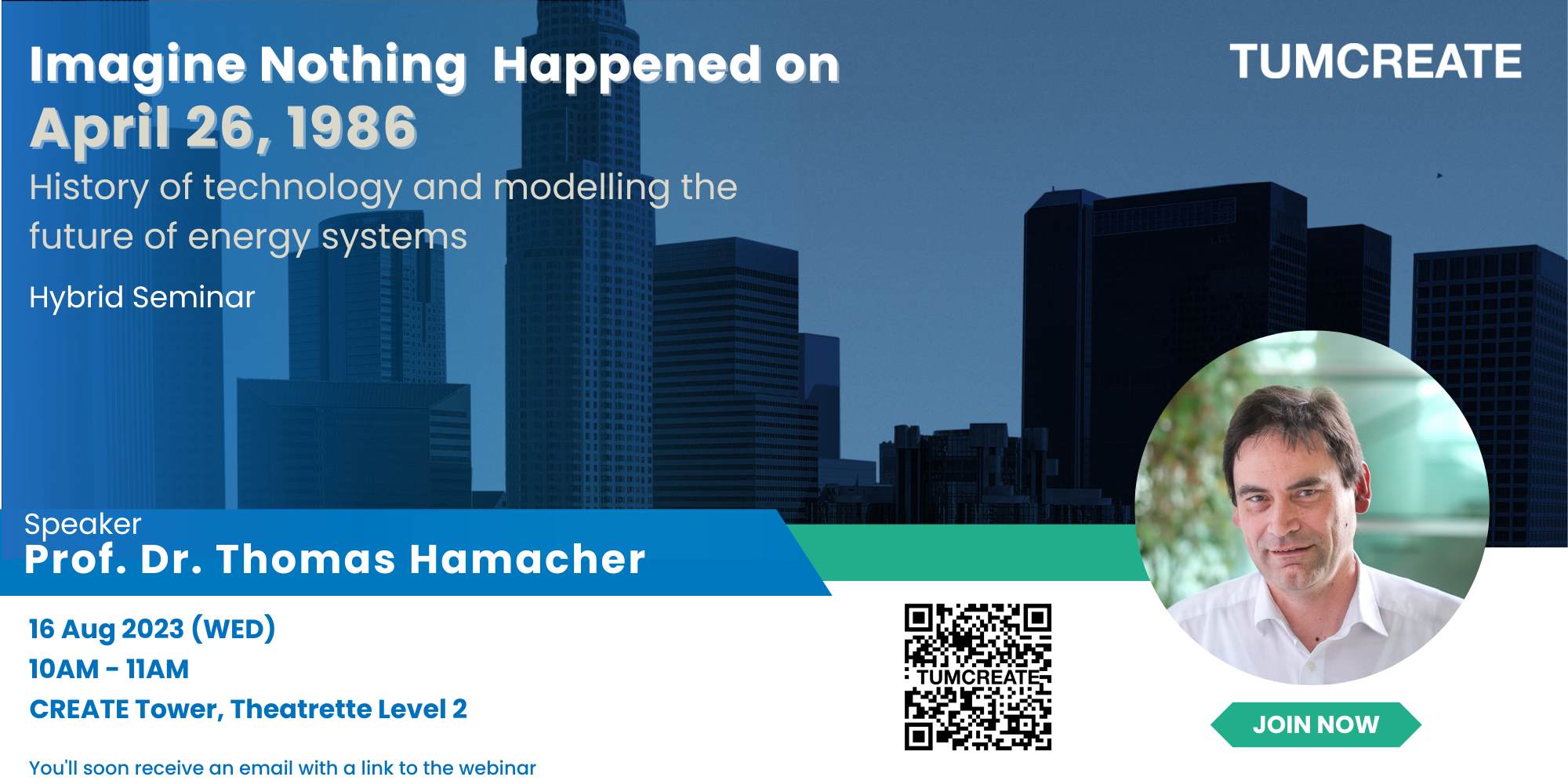- AquaCycle
- Proteins4Singapore
- Singapore's Pathway to Carbon Neutrality
- CellFACE
- LightSPAN
- Computational Modelling Group
- Energy and Power Systems Group
- SITEM - Singapore Integrated Transport and Energy Model
- Past Projects
Events

History of Technology and Modelling the Future of Energy Systems
TUM Special Guest Series 16.08.2023Join TUM Special Guest Speaker series, hosted by TUMCREATE, on the History of Technology and Modelling the Future of Energy Systems by Prof Thomas Hamacher, as he examines what would have happened if nuclear energy had been continuously developed and then in the year 2000 had been used as a competitive power generation technology, especially in the growing markets in Asia.
Date: 16 August 2023, Wednesday
Time: 10am -11am
Venue: CREATE Tower Level 2 Theatrette, 1 Create Way, Singapore 138602
Registration: https://bit.ly/tumcreate-seminar-energyAbstract
For many decades, climatologists have been pointing out the expected problems caused by climate change and calling for a move away from burning fossil fuels. Despite this, there has been a dramatic increase in greenhouse gas emissions, particularly at the beginning of the 21st. century. One of the main drivers was the expansion of electricity generation from coal. How could such a development come about despite the warnings? The answer lies in the lack of alternatives: renewable energies were not yet competitive, gas infrastructure was lacking and nuclear energy was not developed accordingly.
This development can be explained in particular by the move away from nuclear energy in the 1980s. In the 1960s and 1970s, nuclear energy was regarded as the decisive future technology for generating electricity. The anti-nuclear movement did put an end to this development.
In terms of an "alternative" history of technology, the lecture tries to examine what would have happened if nuclear energy had been continuously developed and then in the year 2000 had been used as a competitive power generation technology, especially in the growing markets in Asia and especially China. What effect would such a development have on carbon dioxide emissions?
The aim of the lecture is to create a new understanding of the history of technology and in particular to compare the need for modern efforts to develop future scenarios with developments in the past and to test and question the methods. A gap in the philosophy of science needs to be closed here. What validity do statements about the future have and how can we communicate this better in our work and what did we do wrong in the past?
Speaker's Biography
Professor Hamacher (b.1964) conducts research on energy and systems analysis, focusing on urban energy systems, the integration of renewable energy into the power grid, and innovative nuclear systems (including fusion). Other focuses of his work are the methods and fundamentals of energy models.
After studying physics at Bonn, Aachen and Columbia University (New York), Professor Hamacher received a doctorate from the University of Hamburg for his work on baryonic beta decay. Professor Hamacher has been with the Max Planck Institute for Plasma Physics since 1996, most recently as head of the Energy and System Studies Group. From 2010 to 2013 he served as acting head of the Chair of Energy Management and Application Technology. In 2013, he was appointed Full Professor for Renewable and Sustainable Energy Systems. Furthermore, he is the Director at the Munich Institute of Integrated Materials, Energy and Process Engineering (MEP). Prof. Hamacher is a member of the Environmental Science Centre (WZU) of the University of Augsburg. Since 2011 Prof. Hamacher works also as PI in various projects at TUMCREATE.
Upcoming Events:
No upcoming eventsContact
Corporate Communications TUMCREATE
1 CREATE Way
#10-02 CREATE Tower
Singapore 138602Media and Communications
communications@tum-create.edu.sg

